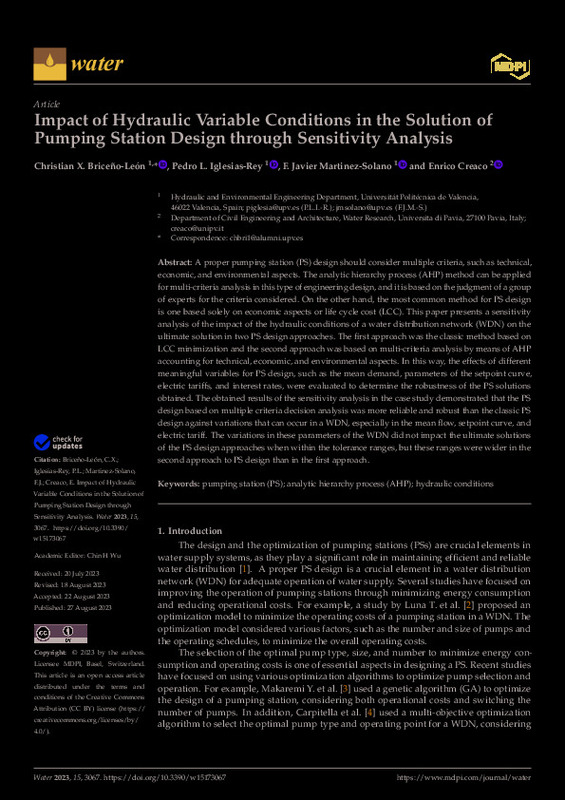JavaScript is disabled for your browser. Some features of this site may not work without it.
Buscar en RiuNet
Listar
Mi cuenta
Estadísticas
Ayuda RiuNet
Admin. UPV
Impact of Hydraulic Variable Conditions in the Solution of Pumping Station Design through Sensitivity Analysis
Mostrar el registro sencillo del ítem
Ficheros en el ítem
| dc.contributor.author | Briceño-León, Christian X.
|
es_ES |
| dc.contributor.author | Iglesias Rey, Pedro Luís
|
es_ES |
| dc.contributor.author | Martínez-Solano, F. Javier
|
es_ES |
| dc.contributor.author | Creaco, Enrico
|
es_ES |
| dc.date.accessioned | 2024-01-10T19:03:53Z | |
| dc.date.available | 2024-01-10T19:03:53Z | |
| dc.date.issued | 2023-09 | es_ES |
| dc.identifier.issn | 2073-4441 | es_ES |
| dc.identifier.uri | http://hdl.handle.net/10251/201749 | |
| dc.description.abstract | [EN] A proper pumping station (PS) design should consider multiple criteria, such as technical, economic, and environmental aspects. The analytic hierarchy process (AHP) method can be applied for multi-criteria analysis in this type of engineering design, and it is based on the judgment of a group of experts for the criteria considered. On the other hand, the most common method for PS design is one based solely on economic aspects or life cycle cost (LCC). This paper presents a sensitivity analysis of the impact of the hydraulic conditions of a water distribution network (WDN) on the ultimate solution in two PS design approaches. The first approach was the classic method based on LCC minimization and the second approach was based on multi-criteria analysis by means of AHP accounting for technical, economic, and environmental aspects. In this way, the effects of different meaningful variables for PS design, such as the mean demand, parameters of the setpoint curve, electric tariffs, and interest rates, were evaluated to determine the robustness of the PS solutions obtained. The obtained results of the sensitivity analysis in the case study demonstrated that the PS design based on multiple criteria decision analysis was more reliable and robust than the classic PS design against variations that can occur in a WDN, especially in the mean flow, setpoint curve, and electric tariff. The variations in these parameters of the WDN did not impact the ultimate solutions of the PS design approaches when within the tolerance ranges, but these ranges were wider in the second approach to PS design than in the first approach. | es_ES |
| dc.language | Inglés | es_ES |
| dc.publisher | MDPI AG | es_ES |
| dc.relation.ispartof | Water | es_ES |
| dc.rights | Reconocimiento (by) | es_ES |
| dc.subject | Pumping station (PS) | es_ES |
| dc.subject | Analytic hierarchy process (AHP) | es_ES |
| dc.subject | Hydraulic conditions | es_ES |
| dc.subject.classification | MECANICA DE FLUIDOS | es_ES |
| dc.title | Impact of Hydraulic Variable Conditions in the Solution of Pumping Station Design through Sensitivity Analysis | es_ES |
| dc.type | Artículo | es_ES |
| dc.identifier.doi | 10.3390/w15173067 | es_ES |
| dc.rights.accessRights | Abierto | es_ES |
| dc.contributor.affiliation | Universitat Politècnica de València. Escuela Técnica Superior de Ingenieros Industriales - Escola Tècnica Superior d'Enginyers Industrials | es_ES |
| dc.description.bibliographicCitation | Briceño-León, CX.; Iglesias Rey, PL.; Martínez-Solano, FJ.; Creaco, E. (2023). Impact of Hydraulic Variable Conditions in the Solution of Pumping Station Design through Sensitivity Analysis. Water. 15(17):1-23. https://doi.org/10.3390/w15173067 | es_ES |
| dc.description.accrualMethod | S | es_ES |
| dc.relation.publisherversion | https://doi.org/10.3390/w15173067 | es_ES |
| dc.description.upvformatpinicio | 1 | es_ES |
| dc.description.upvformatpfin | 23 | es_ES |
| dc.type.version | info:eu-repo/semantics/publishedVersion | es_ES |
| dc.description.volume | 15 | es_ES |
| dc.description.issue | 17 | es_ES |
| dc.relation.pasarela | S\502934 | es_ES |
| dc.subject.ods | 06.- Garantizar la disponibilidad y la gestión sostenible del agua y el saneamiento para todos | es_ES |
| dc.subject.ods | 07.- Asegurar el acceso a energías asequibles, fiables, sostenibles y modernas para todos | es_ES |








